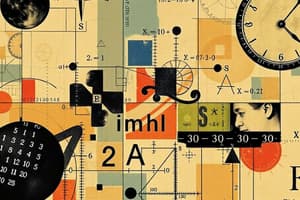Podcast
Questions and Answers
What is the primary role of algebra at the high school level?
What is the primary role of algebra at the high school level?
In algebra, what is the concept that is central and underlies many real-world phenomena?
In algebra, what is the concept that is central and underlies many real-world phenomena?
How is algebra commonly used to represent relationships in various contexts?
How is algebra commonly used to represent relationships in various contexts?
What mathematical tool is frequently used in algebra to model numerical patterns and quantitative relations?
What mathematical tool is frequently used in algebra to model numerical patterns and quantitative relations?
Signup and view all the answers
Which of the following represents a common application of functions in algebra?
Which of the following represents a common application of functions in algebra?
Signup and view all the answers
What plays a crucial role in shaping students' understanding of mathematical concepts?
What plays a crucial role in shaping students' understanding of mathematical concepts?
Signup and view all the answers
What are the three historical stages of algebra?
What are the three historical stages of algebra?
Signup and view all the answers
Which of the following is NOT a key area in algebra?
Which of the following is NOT a key area in algebra?
Signup and view all the answers
Why is addressing misconceptions related to algebraic thinking crucial?
Why is addressing misconceptions related to algebraic thinking crucial?
Signup and view all the answers
Which of the following is an identified challenge for students in algebra?
Which of the following is an identified challenge for students in algebra?
Signup and view all the answers
How does algebra influence mathematics education?
How does algebra influence mathematics education?
Signup and view all the answers
What role does algebra play in shaping students' mathematical education?
What role does algebra play in shaping students' mathematical education?
Signup and view all the answers
Study Notes
Algebra: The Core of Mathematics Education
Algebra is a fundamental branch of mathematics that plays a crucial role in shaping students' understanding of mathematical concepts. It is often considered the foundation of mathematics, as it lays the groundwork for more advanced mathematical topics. In this article, we will delve into the subtopic of algebra and explore its significance in mathematics education.
Algebra as a Foundation
Algebra is a branch of mathematics that deals with the study of symbols and the relationships between them. It is often used to solve problems involving variables and unknowns, making it a powerful tool for representing and analyzing patterns and relationships in various contexts. The primary role of algebra at the high school level, as stated in the NCTM's "A Statements" from 1994, is to develop confidence and facility in using variables and functions to model numerical patterns and quantitative relations.
The concept of function is central to algebra, as it underlies many real-world phenomena. Functions are used to model situations in which one quantity affects change in another, such as determining sales taxes, converting units of measurement, or calculating monetary change from transactions. Functions are also essential for understanding more abstract mathematical concepts, such as graphing polynomial functions and working with variables and equations.
Algebra in the Curriculum
Algebra is taught at various levels in the curriculum, starting from algebraic thinking in elementary school and progressing to algebraic equations, functions, and graphing in middle and high school. Historically, algebra has been divided into three stages: the rhetorical stage, the syncopated stage, and the symbolic stage. These stages reflect the evolution of algebra from a language-based discipline to a more abstract and symbolic one.
In terms of content, algebra is often divided into several key areas: numbers and numerical operations, ratios and proportions, the order of operations, equality, patterning, algebraic symbolism and letter usage, algebraic equations, functions, and graphing. These areas build upon one another, with each subsequent topic requiring a deeper understanding of the foundational concepts.
Challenges and Misconceptions
Despite its importance, algebra can be a challenging subject for students. Researchers have identified common misconceptions and errors related to algebraic thinking, such as difficulty with algebraic symbolism, functions, and graphing. Addressing these misconceptions and improving students' understanding of algebra is crucial for their success in mathematics and beyond.
Algebra's Impact on Mathematics Education
Algebra has had a significant impact on mathematics education, shaping the way we teach and learn mathematics. It has influenced the development of mathematics standards and reform, with a focus on algebraic thinking and the use of algebra as a tool for problem-solving and modeling.
In conclusion, algebra is a vital subtopic within the broader field of mathematics. It provides the foundational knowledge and skills necessary for understanding more advanced mathematical concepts and for applying mathematical principles to real-world situations. As such, it plays a crucial role in shaping students' mathematical education and their future success in mathematics and other fields.
Studying That Suits You
Use AI to generate personalized quizzes and flashcards to suit your learning preferences.
Description
Explore the significance of algebra as a foundation of mathematics education. Learn about its role in modeling patterns, understanding functions, and developing problem-solving skills. Dive into the key areas of algebra and the impact it has on shaping students' mathematical understanding and success.




